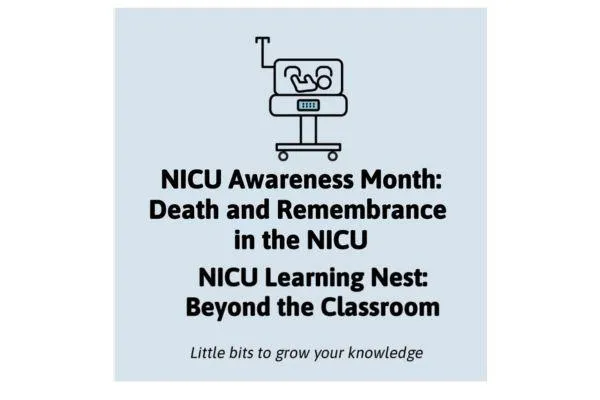
NICU Awareness Month: Death and Remembrance
Death, Dying, and Remembrance in the NICU
Death in the NICU is something no one ever gets used to. Even with all the technology, interventions, and expertise, there are times when the tiniest patients don’t survive. As nurses, we are often the ones at the bedside when those moments come — holding space for families, guiding them through choices, and carrying the weight of memories ourselves.
Over the years, I’ve been present for many different losses. Each one leaves an imprint.
Stories of Loss
The 22-weeker who lived for just 12 hours.
This baby entered the world smaller than my hand. The parents knew survival was unlikely, yet those 12 hours were filled with love. They held their child, kissed them, and whispered a lifetime’s worth of words into that short window. It reminded me that even brief lives carry meaning.The 24-weeker whose mother had to drive.
Transferred from a delivery hospital, the baby was placed on life support before the mother could even arrive. She walked into the NICU hours later, exhausted and terrified, to find her baby surrounded by machines. Helping her navigate those first moments — showing her how to place her hand gently on her baby’s head — taught me how essential our role is in bridging the gap between critical care and human connection.The term baby after a 45-minute code.
Sometimes, despite every effort, we reach a point where continuing resuscitation is no longer the kindest option. I still remember standing by as the team stopped compressions, and the baby was placed in the parents’ arms. That shift from active intervention to end-of-life care is one of the hardest transitions, yet it allows us to focus on comfort, dignity, and presence.The 5-month-old with failing lungs.
Chronic NICU journeys can end just as suddenly. This baby’s family made the agonizing decision to withdraw support when the lungs could no longer function. In those moments, it isn’t about the ventilator or the monitors — it’s about giving parents time to hold, grieve, and remember.
The Nurse’s Role
In each of these situations, the nurse’s role goes beyond medical tasks.
We provide presence — sometimes just sitting quietly.
We empower parents to be parents, encouraging them to hold, bathe, or dress their child.
We normalize grief, reminding families that tears, silence, anger, or numbness are all valid.
We create keepsakes: footprints, photographs, memory boxes.
These small acts may seem simple, but for families, they are often the most precious gifts.
Supporting Families
Grief doesn’t end when a family leaves the NICU. Nurses can connect families to resources that continue support long after discharge:
National groups like Share, March of Dimes, and Compassionate Friends
Local hospital chaplains and grief counselors
Offering resources is just as important as offering blankets or tissues at the bedside. It says, You are not alone in this journey.
Debriefing for the Care Team
Loss in the NICU doesn’t only affect families — it affects staff too.
Immediately after a death:
A quick debrief can help the team review events and clarify medical details. It’s a chance to ensure understanding, check in with one another, and acknowledge the heaviness of the moment before moving on to the next patient.A week or so later:
An emotional debrief offers something different. By then, the shock has softened, and staff may be ready to talk more openly about grief, frustration, or moral distress. These sessions create safe space for nurses, respiratory therapists, physicians, and other team members to process together. Even those who weren’t at the bedside can be impacted by the loss — opening it to the whole team matters.
Both types of debriefing are vital. One addresses the facts; the other honors the feelings. Together, they help staff find closure, resilience, and the ability to keep showing up for families.
Self-Care for Nurses
Caring for families during and after a baby’s death can take a deep emotional toll. Nurses need intentional strategies to protect their own well-being.
Some ways to practice ongoing self-care include:
Journaling or creative outlets to process emotions privately
Talking with trusted peers or mentors who understand the work
Utilizing employee assistance programs, chaplains, or counseling services
Practicing mindfulness, grounding techniques, or exercise
Setting boundaries and taking time for rest
There is a difference between compassion fatigue, moral distress, and burnout — but they all can grow when grief is carried silently. Naming what you’re experiencing and seeking support is not weakness; it’s part of professional sustainability.
Self-care is not about forgetting the babies we’ve cared for — it’s about carrying their memory while continuing to offer compassionate care to the next family who needs us.
Remembering
Every death in the NICU is unique, but the thread that connects them is love. Love from families, love from nurses, and love in the ways we create dignity in those final moments.
This week, as we pause for NICU Remembrance Day, I think of the 22-weeker who lived for 12 hours, the mother racing to reach her 24-weeker, the term baby after the code, and the 5-month-old whose family made the bravest of choices. Their lives were short, but their stories remain.
And for us as NICU nurses, remembering is part of the work. Honoring those babies helps us carry forward compassion, presence, and hope — even in the face of loss.
Reflection & Practice
Here are a few questions and practical tips to carry with you after a loss in the NICU:
For yourself:
What emotions am I carrying after this baby’s passing?
Do I need to talk it out, write it down, or simply take a moment of silence?
What’s one small act of self-care I can prioritize this week?
For your team:
Have we paused to debrief — factually and emotionally?
Who on the team might be struggling quietly and needs a check-in?
What can we do as a unit to honor the memory of this baby?
For families:
Did I offer choices for memory-making and holding?
Did I provide resources for continued support after discharge?
Did I affirm them as parents, honoring their baby’s life and presence?
🌸 Remember: presence, compassion, and remembrance matter more than perfection. Every gesture — small or large — becomes part of the legacy you help a family carry forward.
